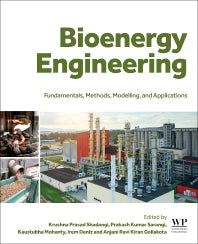Freshly Printed - allow 10 days lead
Couldn't load pickup availability
Bioenergy Engineering
Fundamentals, Methods, Modelling, and Applications
Presents principles, challenges, solutions and future perspectives on the production of biofuels and bioenergy from non-food waste and non-waste feedstocks
Krushna Prasad Shadangi (Edited by), Prakash Kumar Sarangi (Edited by), Kaustubha Mohanty (Edited by), Irem Deniz (Edited by), Anjani Ravi Kiran Gollakota (Edited by)
9780323983631, Elsevier Science
Paperback / softback, published 22 June 2023
586 pages, 140 illustrations (20 in full color)
23.4 x 19 x 2.4 cm, 1 kg
Bioenergy Engineering: Fundamentals, Methods, Modelling, and Applications presents the fundamental principles, recent developments, innovative state-of the-art technologies, challenges, solutions and future perspectives on the production of biofuels and bioenergy. Balancing the scientific and engineering aspects of biofuels production, the book guides readers through the chemical kinetics, modeling, thermodynamics, unit operations and technological advancements in fuel processing from conventional and alternative resources. Each chapter of the book starts with the fundamentals and goes on to assess the latest technologies for the production of renewable fuels on topics. Sections cover biomass utilization, biomass-to-liquid conversion technologies (pyrolysis, liquefaction, solid-state fermentation and submerged fermentation), biomass-to-gas conversion technologies (thermochemical gasification, subcritical and supercritical water gasification, and methanation), gas-to-liquid conversion technologies (Fischer-Tropsch synthesis), carbonization, transesterification, organic transformation, carbon-carbon and carbon-heteroatom coupling reactions, oxidation, reforming, hydrotreating technologies (hydrogenation, hydrodesulfurization, hydrodenitrogenation, hydro dearomatization and hydro demetalization), nanocatalysis and biocatalysis (enzymatic hydrolysis), and much more.
1. Introduction to Bioenergy; Current status, merits and demerits2. Feedstock for biofuel production: starch, oilseed, lignocellulogic and algae based, fuel logistics of Biomass3. Characterization techniques of biomass: Physico- chemical, Elemental, and Biological4. Comparisons between fossil fuels and bio-fuels5. Agricultural waste to fuels and chemicals6. Co-gasification of biomass and coal for the production of biofuels7. Role of Catalysts in Biofuel Production through Fast Pyrolysis8. Advance in Biogas technologies 9. Thermal energy storage materials from triglycerides10. Biological conversion technologies: enzyme hydrolysis, ethanol fermentation11. Anaerobic Digestion Methods for The Production of Fuels12. Microbial fuel cells13. Food wastes for production of bioenergy and recovery of biochemicals through a biorefinery approach14. Algal biofuels and its future prospects15. High-value - added products from microalgae production integrated with bioethanol process16. Bright-skies to biomass fuels in aviation sector17. Biohydrogen as source of bioenergy18. Methods of Catalyst synthesis for biofuel upgrading19. Bio-catalyst for biofuel production20. Microwave synthesis of catalyst for biofuel production21. Alcoholic fuels from restaurant-based food wastes22. The mathematical modeling of biomass gasification processes23. Hydro-de-oxygenation of bio-fuel24. Economic, Social and Ecological Impacts of Bioenergy at Local, National and Global Levels25. Life cycle assessment of biofuels
Subject Areas: Alternative & renewable energy sources & technology [THX]


